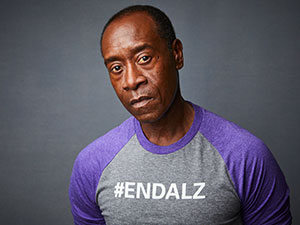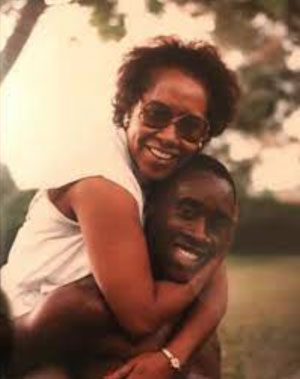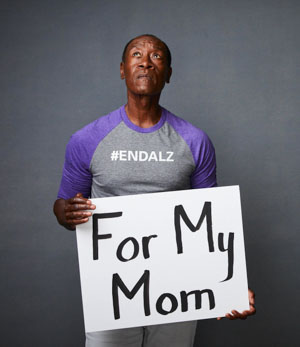
Double Your Love. Double Your Impact.
Double Your Love. Double Your Impact.
Help provide 2x the care and support for millions affected by Alzheimer’s and advance research to bring us closer to a cure. Make a gift during our Double the Love 2x Match now.
Donate NowAward-winning actor Don Cheadle recently spoke to us about his family’s Alzheimer’s journey with his mom, Bettye Cheadle.
Don, tell us about your connection to Alzheimer’s?
 Several of my extended family members had the disease, but the person closest to me was my mom, whom we lost in 2016. My dad and my mother were very close, and they were together until she died. They were married for over 40 years and it was very hard for him to deal with her diagnosis. It really took a toll on him. That’s something I think a lot of people aren’t aware of, and we certainly weren’t aware of at the time – how hard it is for the caregivers.
Several of my extended family members had the disease, but the person closest to me was my mom, whom we lost in 2016. My dad and my mother were very close, and they were together until she died. They were married for over 40 years and it was very hard for him to deal with her diagnosis. It really took a toll on him. That’s something I think a lot of people aren’t aware of, and we certainly weren’t aware of at the time – how hard it is for the caregivers.
My mom was very funny. She had a huge sense of humor and was very quick witted. She would always say, “I can spell memory, but I don't have one.” And we always thought it was just something she was saying, but over time we started noticing that she actually was forgetting things. She was repeating a lot of things and seemingly getting lost over very routine things.
And she always wanted to take pictures of everybody. At first we thought she just wanted to take a lot of pictures, but as we played it back, we realized she was trying to remember and hold on to the images – hold on to people – and stop the slide. I don't know what the average rate of decline is for someone with the disease. I'm sure it's different for everybody, but for us it happened over two or three years.
What was something that you learned over the course of your journey with the disease?
One of the things that we learned from this whole experience is that when the signs start to show and you realize that you’re on this journey, you really have to put your arms around each other – the people who are the caregivers, the family members, the friends. You have to keep pulling each other up while at the same time caring for the person with the disease.
The hardest part was the not knowing – the uncertainty – and the feeling of helplessness. We are a very close-knit family, and we’re used to being able to fix things. Everyone's very capable, but dementia doesn't care that you're capable. It's gonna do what it's gonna do, and you are powerless to prevent what's happening.
What was one of the hardest things about the experience for you?
 My father really didn't think anyone else should care for my mom. He felt that no one was better qualified to take care of Mom because of his undying love for her. That was really hard to watch. Like I said, they were very close. The toll this disease takes on the people who are left behind is something that we are still processing to this day.
My father really didn't think anyone else should care for my mom. He felt that no one was better qualified to take care of Mom because of his undying love for her. That was really hard to watch. Like I said, they were very close. The toll this disease takes on the people who are left behind is something that we are still processing to this day.
I found that one of the cruelest things about the disease that happens is when the window opens for a moment, and your loved one is back and you can have a conversation with them. Then that window closes again, and you remain hopeful that somehow that opening is going to lead to them coming back. It's just a cruel joke.
What’s the one thing you wish people knew about Alzheimer's?
I hope sharing my story can help strengthen people’s ability to recognize the early signs of the disease so they can seek help sooner. Until there is a cure, until there is some way to stem the tide of the disease, we have to understand how to cope with it – how to find the strength to deal with it. I also hope people will remember to be kind to themselves and give themselves a break – physically, mentally, spiritually and emotionally. The way to show up the best for someone is to make sure that you're taking care of yourself, too, so that you can be fully present to take care of the person who's living with the disease. And it’s important to remember that those who go through it with the person who's suffering from the disease are also suffering from the disease in a different way.
You’ve talked a lot about the impact of the disease on caregivers. Is there anything you’d like to say to those currently caregiving for a loved one?
I want to say thank you to the caregivers. I understand how difficult it is, what a commitment it is, and how important it is. Please make sure that you're taking care of yourself because you have to have some self to bring to this very, very difficult job that will take everything out of you. It will tax you all the way to the end.
 It was particularly tough because my mom was so strong-willed and so independent. She would talk often about not wanting to become a burden to anyone. But, at the end of the day, it wasn't a burden in the way that I think she thought. It was hard, and it was emotionally draining. It was taxing, and it was sad and unrelenting. But, ultimately, the grace and the takeaway that made it bearable was the love that it revealed in our family. It concretized something that we knew was already there. When we showed up in that way, and when we came together in that way, it was because of Mom. She was still the centering part of our relationship and brought all of us together, even though it came at an incredibly hard cost.
It was particularly tough because my mom was so strong-willed and so independent. She would talk often about not wanting to become a burden to anyone. But, at the end of the day, it wasn't a burden in the way that I think she thought. It was hard, and it was emotionally draining. It was taxing, and it was sad and unrelenting. But, ultimately, the grace and the takeaway that made it bearable was the love that it revealed in our family. It concretized something that we knew was already there. When we showed up in that way, and when we came together in that way, it was because of Mom. She was still the centering part of our relationship and brought all of us together, even though it came at an incredibly hard cost.
If caregivers can extract that from this experience and look to those grace notes, then hopefully they can keep showing up because it's really, really, really important work.
Related Articles

The first survivor of Alzheimer's is out there, but we won't get there without you.
Donate Now
Learn how Alzheimer’s disease affects the brain.
Take the Brain Tour
